News & Events in Belarus
Lukashenko points to flaws in planning strategic projects
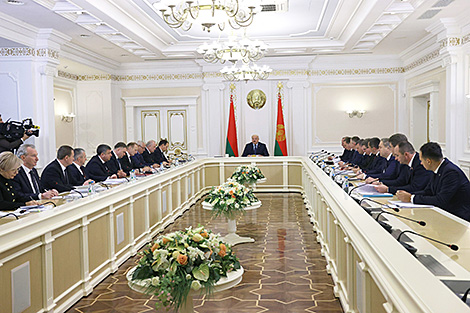
MINSK, 20 October (BelTA) – Belarusian President Aleksandr Lukashenko convened a meeting on 20 October to discuss ways to improve the system of planning and overseeing the implementation of strategic projects, BelTA has learned.
We need to look to the future. Why do strategic projects matter?
The head of state emphasized the importance of strategic projects: “This is the future of not only a system but of a country in general. Strategic projects, if we talk about Belarus, are the future of our country,” he said.
“No person, no system, no state can exist without the future,” the president added.
At the same time, he drew attention to the obvious shortcomings in this work: “Even if we have reasonably developed strategic projects, we do not always implement them,” he said. The head of state warned that the fulfillment of the instructions will be closely supervised.
According to the head of state, the aim of the meeting is to discuss the ways to improve the system of planning and overseeing the implementation of strategic projects. Everything is important in this area - from the idea to its implementation and guaranteed economic effect, Aleksandr Lukashenko emphasized.
“The shock restructuring of the global political, economic and financial relations prompts every country to think beyond protective and compensatory measures. We need to calculate the strategic prospects for the development of the national economy (hence the state). We need to look to the future,” the president said.
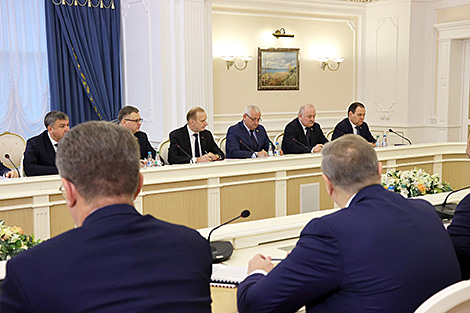
What has already been done and are there any flaws?
According to the head of state, over the past thirty years Belarus has developed a wide network of research institutes in various fields. Among them however there are such that need comprehensive reforms. In this regard, the president reminded the government of his demand to review the number and structure of research institutes “to get rid of those that do not produce results”. This requirement also applies to ministerial institutes, including those in healthcare, labor and social security, sports, culture and other areas.
Aleksandr Lukashenko also mentioned the State Committee on Science and Technology and the National Academy of Sciences. The latter is in for a comprehensive inspection in the near future. “A detailed analysis of the operation of the Academy of Sciences should be carried out in winter. I hope that everything will be as the head of the Academy reports to us: today they make everything - from drones to milk powder products, which are sold to China. They make everything. We will see if that is true. I mean electric cars and so on,” the president said.
Continuing the talk about the work of Belarusian scientists, Aleksandr Lukashenko noted that their research, analytical work, forecasts of scientific and technological progress for decades ahead were certainly needed. “We must admit however that the real sector of the economy does not seek to use the works of scientists on a large scale for some reason,” the Belarusian leader said. “Not all new developments reach production.” According to him, very few large, breakthrough projects have been developed over the time.
“Yes, we have built a nuclear power plant, BNBC [Belarusian National Biotechnology Corporation]. We produce the world's largest haul trucks, implement space programs, develop and test products of innovative biomedicine, which are unmatched worldwide. However, all these projects have been launched only at the president's suggestion,” Aleksandr Lukashenko said.
“Where are the projects born thanks to hard work, in the depths of the Academy of Sciences? Where are they?” he asked rhetorically.
“As we can see, there are some flaws. They are primarily in the planning of strategic projects, objects of high (5th and 6th) technological paradigms,” the head of state said.
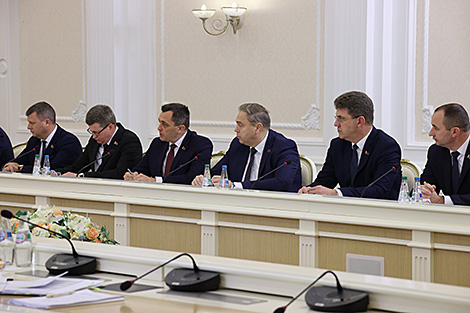
What will the “brain core” for project assessment look like?
Aleksandr Lukashenko added that in spring 2023 he instructed the government, the Academy of Sciences and his assistant Aleksandr Kosinets to launch work on the so-called brain core capable of assessing and supervising large-scale projects in the country. By the way, such projects have already been identified.
“We need a center which will act on behalf of the president and will see what is going on in the country and make all of you implement these projects,” the head of state explained.
What decisions have been presented to the president?
The government presented to the head of state a version with two main structures: a center that develops ideas and calculates their economic effect, and a council which decides on the viability and relevance of such ideas. The final decision on the largest projects is to be made by the head of state.
“Please tell me how those implementing the project will make part of this chain. I am talking about ministers, directors, chief engineers. They are the ones who will implement these projects. How will the projects be provided with personnel and resources? Who will assume the risks, guarantee the economic viability and success of the new enterprises? Will it be the Council? The Center? Minister? Director?” Aleksandr Lukashenko listed the key questions on the topic. According to the president, the answer to some of them proceeds from what has been said earlier. If the head of state is to make the final decision on strategic projects, he will determine who will be responsible for their implementation.
Aleksandr Lukashenko also asked to specify why the proposed center was necessary: “What prevents us from implementing the best ideas in the existing composition? There should be no new structures and additional staff. We have enough of these centers and ‘subcenters' that should be organized into a single system to move in the right direction.” The president emphasized that any new “government” or “ministry” was out of the question. “We should keep this in mind while making these decisions,” the head of state said.
The president paid special attention to the role of governors in the implementation of strategic projects: “You are not outsiders, remember this: the failure of a project on your territory will mean your failure. This is also your area of responsibility. You know the situation on the ground better than anyone. You will receive part of the taxes from the implementation of the project as well.”
The head of state suggested listening to different points of view, discussing the available proposals, taking into account all positions in order to choose the most pragmatic way.
“In pursuance of your instruction given to consider the issues related to the development of domestic microelectronics, we have looked into the possibility of setting up a center of strategic projects,” Deputy Head of the Belarus President Administration Maksim Yermolovich said.
“Have you unequivocally come to the decision that this center is a must? Or are there doubters? Is it really needed? The main question is to be or not to be,” the president stressed.
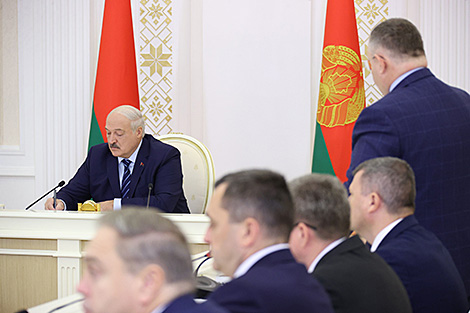
Maksim Yermolovich said that all problematic issues arising in the planning and implementation of major investment projects were analyzed, foreign and Soviet experience in developing large-scale production facilities was studied. He recalled that the center of large-scale projects in the USSR was the State Planning Committee of the Council of Ministers (Gosplan) which supervised the implementation of national economic plans, coordinated and financed technical and economic research by scientific and design organizations throughout the country, and implemented projects of the largest enterprises as well as the union construction projects.
“Large-scale projects were implemented on the basis of a systematic approach, which comprised planning for the development of the national economy both by sectors and regions, and also planning of inter-sectoral problems. Even the countries that were members of the Council of Mutual Economic Assistance carried out their production cooperation within the framework of the Gosplan system. Today there is no single center in Belarus to determine large-scale investment projects and capital investments. The process is decentralized and is carried out according to the proposals from the national government bodies, oblast executive committees or investors. The most significant projects in the history of sovereign Belarus, such as BelNPP, BNBC, BelGee, large-scale modernization of the woodworking industry, were initiated by the head of state,” the Deputy Head of the Belarus President Administration said.
However, even at such a level, the implementation of projects was carried out in conditions of insufficient interdepartmental cooperation, and the executors faced the need for repeated discussion, coordination and justification of investments, Maksim Yermolovich said. According to him, at present there are problems both at the stage of design decisions (what to build and where) and during the implementation of the projects.


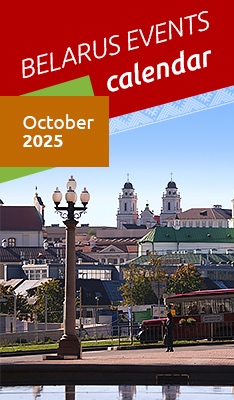




 print version
print version make home page
make home page add to bookmarks
add to bookmarks

